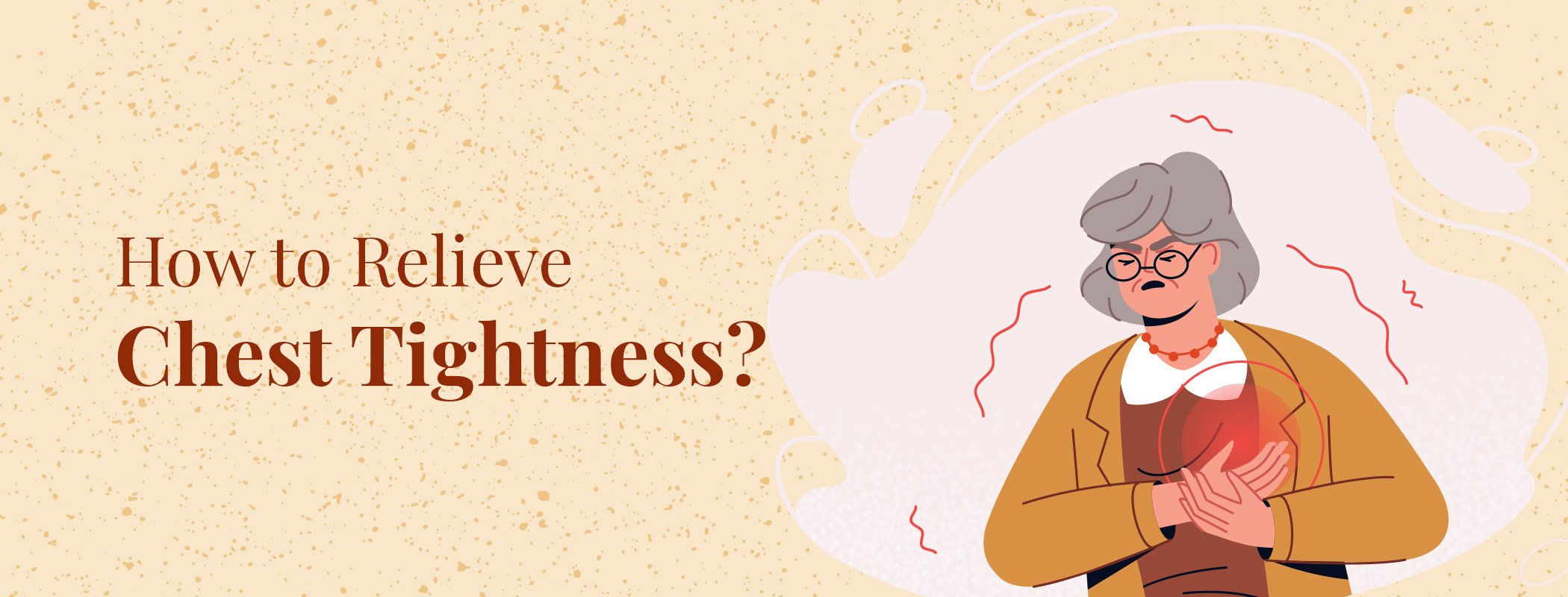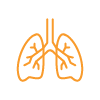How to relieve chest tightness?
May 17, 2023

What is Chest Tightness?
Chest tightness refers to a sensation of pressure or constriction in the chest area. It may feel like a band around the chest or a weight pressing on the chest. People often describe it as feeling squeezed or having difficulty taking deep breaths. Chest tightness can occur suddenly or develop gradually, and other symptoms may accompany it.
Causes of Chest Tightness
There are various causes of chest tightness, including:
- Anxiety or stress
- Asthma or allergies
- Acid reflux or gastroesophageal reflux disease (GERD)
- Muscle strain or tension
- Respiratory infections, such as bronchitis or pneumonia
- Heart-related issues, such as angina or a heart attack
- Costochondritis (inflammation of the cartilage that connects the ribs to the breastbone)
- Pulmonary embolism (blockage of a blood vessel in the lung)
- Panic attacks or anxiety disorders
Symptoms of Chest Tightness
Chest tightness may accompany other symptoms, which can vary depending on the underlying cause. Common symptoms include:
- Shortness of breath or difficulty breathing
- Chest pain or discomfort
- Rapid heartbeat or palpitations
- Sweating
- Dizziness or lightheadedness
- Nausea or indigestion
Risk Factors of Chest Tightness
Certain factors may increase the risk of experiencing chest tightness. These include:
- Smoking or exposure to secondhand smoke
- Obesity or being overweight
- Sedentary lifestyle or lack of physical activity
- Family history of heart disease or respiratory conditions
- High levels of stress or anxiety
- Poorly controlled asthma or allergies
Home Remedies for Chest Tightness
- Deep Breathing Exercises: Practice slow, deep breaths to help relax your chest muscles and improve airflow. Inhale deeply through your nose, hold for a few seconds, and exhale slowly through your mouth.
- Relaxation Techniques: Engage in activities like meditation, progressive muscle relaxation, or yoga to reduce stress and promote relaxation, which can alleviate chest tightness associated with anxiety or tension.
- Warm Compress: Applying a warm compress to your chest can help relax muscles and relieve tightness. You can use a hot water bottle or a warm towel for this purpose. Ensure that the compress is warm, not hot, to avoid burns.
- Herbal Tea: Certain herbal teas have soothing properties that can help ease chest tightness. Chamomile tea is known for its calming effects, while peppermint tea may help relax the muscles in the chest. Drink warm herbal tea to promote relaxation.
- Hydration: Staying hydrated is essential for overall health, including respiratory function. Drinking plenty of water can help thin mucus, improve airflow, and reduce chest congestion.
- Avoid Triggers: Identify and avoid triggers that may worsen your chest tightness. These can include allergens, irritants like smoke or chemical fumes, and certain foods that may contribute to acid reflux.
- Healthy Diet: Maintaining a nutritious diet is crucial for optimal respiratory health. Include foods rich in antioxidants, such as fruits, vegetables, and nuts, which can help reduce inflammation. Additionally, foods high in omega-3 fatty acids, like fatty fish or flaxseeds, have anti-inflammatory properties.
- Regular Exercise: Regular physical activity can improve lung function and cardiovascular health. Aim for moderate exercise, such as brisk walking or swimming, to help relieve chest tightness over time.
- Humidifier: If you live in a dry environment, using a humidifier can add moisture to the air and help prevent respiratory irritation, which may alleviate chest tightness.
Foods to Relieve Chest Tightness
- Ginger: Known for its anti-inflammatory properties, ginger can help reduce inflammation in the airways and relieve chest tightness. You can consume it as tea or incorporate it into your meals.
- Turmeric: This spice contains curcumin, a compound with potent anti-inflammatory effects. Adding turmeric to your dishes or drinking turmeric tea may help alleviate chest tightness.
- Garlic: Garlic has natural anti-inflammatory and antioxidant properties that can promote respiratory health. Incorporate garlic into your cooking or consume it raw for potential benefits.
- Honey: Honey is known for its soothing properties and can help ease coughing and irritation in the respiratory system. Add a spoonful of honey to warm water or herbal tea.
- Leafy Green Vegetables: Leafy greens like spinach, kale, and broccoli are rich in antioxidants and vitamins that support lung health. Include them in your meals as salads, stir-fries, or smoothies.
- Fatty Fish: Cold-water fatty fish like salmon, mackerel, and sardines are excellent sources of omega-3 fatty acids. These healthy fats have anti-inflammatory effects and may help reduce chest tightness.
- Citrus Fruits: Citrus fruits such as oranges, grapefruits, and lemons are packed with vitamin C, which can support lung health and reduce inflammation. Enjoy them as fresh fruits or squeeze them into water for a refreshing drink.
- Nuts and Seeds: Almonds, walnuts, flaxseeds, and chia seeds are rich in omega-3 fatty acids and antioxidants, making them beneficial for respiratory health. Snack on these nutritious options or sprinkle them over salads or yogurts.
- Green Tea: Green tea contains antioxidants that may help reduce inflammation and promote lung health. Enjoy a cup of green tea daily to reap its potential benefits.
- Oats: Oats are high in fiber and can help regulate digestion, which may indirectly alleviate chest tightness related to acid reflux. Start your day with a bowl of oatmeal for a nourishing breakfast.
Remember, incorporating these foods into your diet should complement a healthy lifestyle. If you have specific dietary restrictions or allergies, consult with a healthcare professional or a registered dietitian for personalised advice.
It’s important to note that these home remedies and dietary suggestions may provide relief for mild cases of chest tightness. If you have persistent or severe symptoms, it’s crucial to consult a healthcare professional for a proper diagnosis and appropriate treatment.
When to consult a doctor?
1. Seek Immediate Medical Attention:
-
- These could be signs of a heart attack if you experience sudden, severe chest tightness or pressure, especially if it radiates to your arm, jaw, or neck.
- If you have difficulty breathing, persistent shortness of breath, or chest tightness accompanied by lightheadedness, dizziness, or fainting.
2. Consult a Healthcare Professional:
-
- If you have recurring or persistent chest tightness that is not related to a known medical condition.
- If your chest tightness is accompanied by other concerning symptoms, such as fever, coughing up blood, rapid heart rate, or significant weight loss.
- If you have a history of heart disease, asthma, chronic obstructive pulmonary disease (COPD), or other respiratory conditions, as your healthcare provider can help manage your specific situation.
3. Who to Consult:
-
- Start by consulting with your primary care physician or general practitioner, who can assess your symptoms, conduct a physical examination, and recommend further diagnostic tests or refer you to a specialist if needed.
- Depending on the suspected cause of your chest tightness, you may be referred to a cardiologist for heart-related concerns, a pulmonologist for respiratory conditions, or a gastroenterologist for digestive issues like acid reflux.
It’s important to note that this is general guidance, and individual cases may vary. If you are unsure or have concerns about your symptoms, always consult a healthcare professional for an accurate diagnosis and appropriate treatment.
People also ask
1. How to relieve chest tightness and shortness of breath?
- Practice deep breathing exercises.
- Use relaxation techniques like meditation.
- Sit in an upright position.
- Identify and avoid triggers.
- Increase air circulation with a fan or open window.
- Stay hydrated.
- Consider over-the-counter medications (consult a professional).
2. How to relieve chest tightness from anxiety?
- Practice deep breathing exercises.
- Engage in relaxation techniques like meditation or yoga.
- Challenge negative thoughts.
- Create a calming environment.
- Seek support from trusted individuals.
- Engage in regular exercise.
- Limit caffeine and stimulant intake.
- Practice stress management techniques.
3. How to relieve chest tightness from acid reflux?
- Eat smaller, more frequent meals.
- Avoid trigger foods.
- Maintain a healthy weight.
- Elevate the head of your bed.
- Chew sugar-free gum after meals.
- Avoid eating close to bedtime.
- Wear loose clothing.








